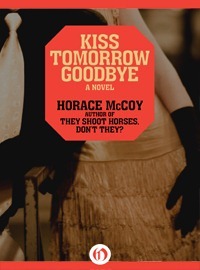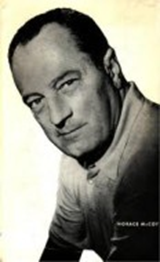Kiss Tomorrow Goodbye (Midnight Classics)
The second of Horace McCoy’s noir classics, republished in April by Open Road Media in a nicely formatted eBook with perhaps the most extensive biography of McCoy available. Published in 1948 at the start of what scholars consider the beginning of the Noir/Paperback era in crime fiction (and the end of the hardboiled era of authors like Dashiell Hammett, Chandler and the pulp magazines and their authors) , Kiss Tomorrow Goodbye leans towards the hardboiled genre, that had just past, but enters the noir era. The book is full of lively dialogue and tough guys and femme fatales that were also “tough gals”, and though it comes nowhere close to Raymond Chandlers snappy, cynical wit, it stacks up nicely with most of the hardboiled writing of the era.
McCoy, from Tennessee, served in the first world war. After the war he relocated to Texas where he spent the years between 1919 and 1930 as a sports editor for the Dallas Journal . It was while he was in Texas that he got bitten by the acting bug which led him to acting in local theater that eventually saw him move to California in an attempt, at first to become a movie star. This experience was put to good use in his novels and short stories which often depicted central characters that were either involved, usually with little success, in the budding film industry. In the late ‘20s he started his writing career by selling short stories to various pulp mystery magazines such as Amazing Stories, Black Mask and Dime Detective. He went on to publish his first novel, They Shoot Horses, Don’t They? in 1935. Between ‘35 and 1961 (Corruption City was published posthumously in 1961) he published 5 more novels. He spent most of his efforts working as a script writer after the success of They Shoot Horses, Don’t They? (which we reviewed last week) from 1935 until his death in 1955. Kiss Tomorrow Goodbye, is among his best efforts and was turned in to a film starring James Cagney as the protagonist, Ralph Cotter. the film, and the book were widely banned because it was "a sordid, sadistic presentation of brutality and an extreme presentation of crime with explicit steps in commission." I guess they didn’t want little Johnny learning step by step criminal schemes.
The movie received mixed reviews by the American critics, and was often compared unfavorably to White Heat which features Cagney in a similar role. Nevertheless, the film had a great influence on the French filmmakers who loved pulp fiction and gave the genre the name, film noir, and can be seen, for example, in Jean-Luc Godard’s film Made in U.S.A, in which one character is reading this novel in its French translation, Adieu la vie, adieu l’amour. Indeed, the influence led McCoy and other writers such as David Goodis and James M. Cain ,works to be relabeled ‘noir’ differentiating them from the classic ‘hardboiled’ detective novels of Hammett, Chandler and others.
Kiss Tomorrow Goodbye is the story of Ralph Cotter, an unquestionably amoral man who sees himself as intellectually superior because of his Ivy League education and his having been born into an upper class family, although his pedigree is questionable and he avoids any proof when challenged by his minions, one exchange; “Does it matter?” (where he went to college) “You’re not ashamed of it , are you?” “I think the college might be. I’m sure my career doesn’t reflect too much credit on the school. It does prove one thing, though it proves that I came into crime through choice not through environment. I didn’t grow up in the slums with a drunk for a father and a whore for a mother and come into it because it mistreated me and warped my soul. Every criminal I know – who’s engaged in violent crime – is a two-bit coward who blames society. I need no apologist or crusader to finally hold my lifeless body up to the world and shout for them to come observe what they have wrought.” It’s easy to take this book as nothing more than a great ‘genre story’ but McCoy’s use of the then topical subject of “nature verses nurture” is important to the times he lived as many of the “folk lore” criminals of the day such as John Dillinger and Baby Face Nelson were raised in ‘broken homes’ and the apologists of the day explained their antisocial behavior on the hard times of the day.
The book opens with Ralph, along with a fellow inmate, Toko, breaking out of prison on a chain gang. They are aided by Holiday, the buxom gun moll cum femme fatale of the piece. Once successful, Ralph immediately starts pulling robberies in the unnamed town where he is hiding out. On his first job, he ends up being double crossed and when confronted by the police who at first seem about to shoot him, Holiday and Jinx, who had aided in the escape, but take their money instead and tell them to take the first bus to Phoenix.
Ralph comes up with a scheme to turn the tables on the crooked cops by recording them on a phonograph talking about a bigger heist and presumably aiding the gang in the crime. He uses this to blackmail the high ranking Inspector Webber and along the way meets and employs the lawyer, Mandon to help him setup his blackmail scheme. As he carries on a tumultuous relationship with Holiday, and plans bigger and bigger capers, Ralph (having taken on the alias of Paul Murphy) is soon revealed as not only wanting to gain riches but to climb socially as well. While trying to locate a con artists that can help him pull off his blackmail scheme he meets Margret, who he sees as a step up the social ladder. But after being caught In flagrante delicto with Margret and coming up with the excuse they had just been married, Ralph figures he has bitten off more than he can chew and consequently turns down $35,000 in bribe money to sign an annulment.
As Ralph, showing disdain for his loosely formed criminal gang, now with the aid of the crooked police and the shyster Mandon, plans to hold up, and kill, the bag men for a local mafia don, he details a complex and involved strategy. When the crime goes off without a hitch, he is at his most egotistic in the false belief that his superior intellect and planning were the reason for their success. He lords it over Holiday, Jinx and even Mandon, and instead of sowing respect earns more and more resentment from his compatriots.
But Margret and her wealthy industrial giant of a father has a new found respect for Ralph because he turned down the bribe. He offers Ralph a million dollars to marry Margret, who is infatuated with Ralph. Ralph has no desire to be married, but a million dollars and the respectability the offer could bring him tempts him. But he soon learns that he isn’t as smart as he thinks he is and that old barb about a woman scorned combined with karma can be a bitch.
McCoy drew the story in a very Hammett like way. The unnamed town, the prevalence of crooked small town politicians and superficial upper crust characters are all devices that Hammett used to great effect in his Continental Op stories. But McCoy adds to that many elements that would become in the coming decade of the ‘50s typical of the ‘noir’ genre. Instead of the lone good guy against the array of bad guys – crooked cops and crookeder crooks – and the damsel in distress femme fatale, McCoy introduces the tough gal in Holiday and nary a character is admirable. Everybody has their own motivations and most of those are deplorable and the characters are thus, beyond redemption. Further, though Ralph on occasion displays competence, his ego wants to see his successes as brilliance on his part when what it is is mostly luck.
McCoy also rises above the typical hardboiled/noir fare by introducing many topical subjects of the day; the deplorable conditions in prisons, “Not much of the morning could get into the place where I was, and the portions that did were always pretty well mauled and no wonder: they had to fight their way in through a single window at the same time a solid shaft of stink was going out. This was a prison barracks where seventy-two unwashed men slept chained to their bunks, and when the individual odors of seventy-two unwashed men finally gather into one pillar of stink you have got a pillar of stink the like of which you cannot conceive; majestic, nonpareil, transcendental, K.” (I’m not sure whether the ‘K’ is a misprint or an obscure term.). He also alludes to male rape in prisons and homosexuals who Ralph comes to accept as fellow rebels, he thinks to himself at one point “ We all had a little twilight in our souls; in every man there are homosexual tendencies, this is immutable, there is no variant, the only variant is the depth of the latency….They were rebels too, rebels introverted; I was a rebel extroverted. theirs was the force that did not kill, mine was the force that did kill.” . There is also the subject of “nature verses nurture” which was very much in discussion at the time the book was written. Further, he reveals much about Ralph and uses a plot device that would become stock in noir fiction through Ralph’s inner dialogs which are almost as numerable as the tough guy banter between the characters. This also portrays Ralphs rising mania to not only out wit the system but to rise above the typical slow witted crooks he is forced to employ in his schemes.
Altogether, not only a tour de force of hardboiled noir fiction, but a literary triumph of genre fiction from one of the grandfathers of the style and a wonderful edition now available in a nicely formatted eBook with an extended biography of the author.
Article first published as Book Review: Kiss Tomorrow Goodbye by Horace McCoy on Blogcritics.
Copyright © 2012 Robert Carraher All Rights Reserved

















